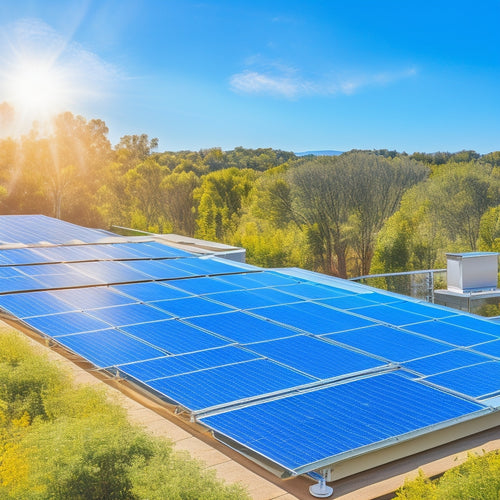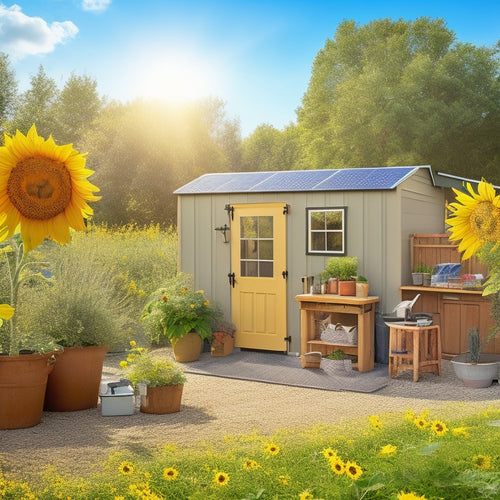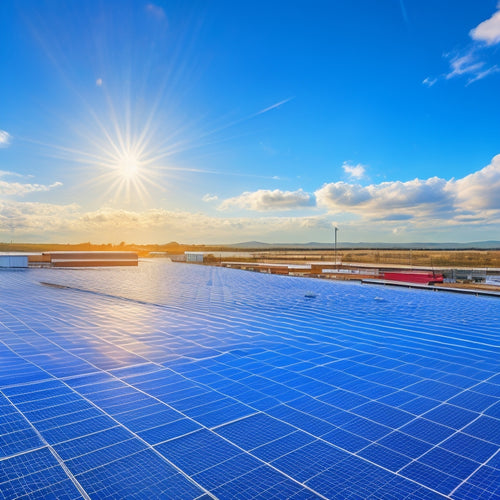
Off Grid Power Supplies for a Self-Sustaining Homestead
Share
Off-grid power supplies are essential for your self-sustaining homestead, allowing you to make use of renewable energy sources like solar panels and wind turbines. These systems reduce your reliance on traditional utilities, providing energy independence while minimizing your carbon footprint. With effective battery storage, you can guarantee energy availability even during cloudy days or low winds. Initial setup costs might seem high, but they're a long-term investment that offers significant savings on energy bills. Evaluating your daily energy requirements helps tailor your system for peak efficiency, making sure you meet your needs sustainably. Investigate further to uncover more perspectives on optimizing your off-grid setup.
At a Glance
- Off-grid solar and wind systems provide sustainable energy solutions, reducing reliance on traditional power sources and minimizing carbon footprints.
- Effective battery storage is crucial for ensuring energy availability during non-sunny periods and maximizing excess energy utilization.
- Proper system maintenance, including regular inspections and inverter upkeep, enhances the longevity and efficiency of off-grid power systems.
- Assessing daily energy needs and peak usage times helps in selecting the right system size and optimizing energy consumption.
- Off-grid systems promote energy independence, leading to long-term cost savings and a reduced environmental impact.
Eco-Friendly Energy Solution
When considering eco-friendly energy solutions for your homestead, solar energy systems and wind turbines stand out as practical options.
Off-grid solar systems offer energy independence, allowing you to considerably reduce your reliance on traditional power sources. Solar panels capture sunlight to generate electricity, while wind turbines convert wind energy into power, both reducing your carbon footprint.
Solar Energy Systems
Utilizing the power of the sun through solar energy systems offers a practical and sustainable solution for those looking to live off the grid. By tapping into solar energy, you can notably decrease your reliance on conventional power sources, enhancing your freedom and independence.
To make the most of your solar energy system, focus on solar panel efficiency. High-efficiency panels convert more sunlight into usable energy, allowing you to maximize your power output even in limited space.
Research different brands and models to find the best fit for your homestead needs.
Complementing your solar panels with effective battery storage solutions is essential. These systems store excess energy generated during sunny days, ensuring you have power available during cloudy weather or nighttime.
Investing in quality batteries can enhance your energy security and reduce waste, as you'll be able to use all the energy your panels produce.
Wind Turbine Benefits
Incorporating wind turbines into your off-grid power strategy can greatly enhance your energy independence. These eco-friendly systems utilize the power of the wind, providing a renewable energy source that can supplement or even replace traditional power methods.
One of the key advantages is turbine efficiency; modern turbines are designed to maximize energy output, converting wind energy into usable electricity with impressive effectiveness.
However, there are important installation considerations to keep in mind. You'll need to assess your location's wind patterns, as consistent, strong winds are essential for ideal performance.
Additionally, turbine placement is critical; positioning them away from obstructions like trees or buildings can greatly improve efficiency.
Choosing the right turbine size for your energy needs is also vital. Oversized turbines can lead to wasted energy, while undersized ones may not meet your demands.
By carefully evaluating these factors, you can create a balanced energy system that reduces reliance on external sources and increases your autonomy.
Ultimately, wind turbines offer a practical solution, allowing you to enjoy the freedom of sustainable living while minimizing your environmental footprint.
Cost-Effective Long-Term Investment
When considering an off-grid power supply, it's essential to evaluate both the initial setup costs and long-term maintenance.
Off-grid solar systems not only offer energy independence but also enhance self-sufficiency for your homestead.
While the upfront investment may seem intimidating, the longevity and efficiency of these systems can lead to significant savings over time.
Initial Setup Costs
Setting up an off-grid power supply can initially seem like a challenging financial commitment, but viewing it as a long-term investment reveals its true value.
When you're planning your homestead, consider the initial investment strategies that can make this shift smoother. Start by evaluating your energy needs and selecting the right system—solar panels, wind turbines, or a combination of both.
Budget planning is essential here. Break down the costs into manageable chunks and identify the most significant expenses, such as batteries and inverters, which can be substantial.
You might also want to investigate financing options or grants to ease the upfront burden.
Remember, these expenses pay off over time. By generating your own power, you're not just reducing your monthly bills; you're also gaining independence from utility companies.
Think about the savings on energy costs that accumulate over the years, and factor in potential increases in utility rates.
Ultimately, while the initial setup costs can be intimidating, the freedom and sustainability you'll achieve far outweigh the upfront investment.
Investing wisely now can lead to a self-sufficient future.
Maintenance and Longevity
Maintaining an off-grid power system is vital for guaranteeing its longevity and efficiency, making it a cost-effective long-term investment. Regular system inspections allow you to identify potential issues before they escalate. This proactive approach is essential for routine upkeep, which includes cleaning solar panels and checking connections.
Battery care is a significant part of maintenance; verify they're charged correctly and monitor their performance regularly.
Inverter maintenance also shouldn't be overlooked, as this component converts your stored energy into usable power. Keeping it clean and functioning at peak performance guarantees you're not losing energy.
Consider implementing longevity strategies like weatherproofing techniques to protect your system from harsh elements. This could involve using protective coverings or verifying your setup is raised and secure.
Component replacement should be factored into your budget, as parts like batteries and inverters have limited lifespans.
Key Advantages of Off-Grid Systems
When you choose an off-grid system, you gain significant energy independence, allowing you to rely less on external power sources. This autonomy not only enhances your self-sufficiency but also reduces your environmental impact by minimizing reliance on fossil fuels.
By utilizing renewable energy, you contribute to a cleaner planet while ensuring a stable power supply for your homestead. Additionally, off-grid systems provide significant cost savings from reduced energy bills and enhance your budget planning, leading to greater financial freedom and security.
Energy Independence Benefits
Achieving energy independence through off-grid power supplies offers numerous benefits that can greatly enhance your homesteading experience. By tapping into renewable resource management, you reduce your reliance on external energy sources, ensuring a stable and consistent power supply. This enables you to take control of your energy needs while implementing effective self-sufficiency strategies.
One of the most significant advantages is financial savings. Once you've made the initial investment in renewable energy systems, such as solar panels or wind turbines, your ongoing energy costs decrease dramatically. You'll no longer be at the mercy of fluctuating utility rates or potential energy shortages.
Moreover, off-grid systems provide resilience against power outages, letting you maintain your lifestyle even during emergencies. You can also tailor your energy system to meet your specific needs, optimizing efficiency and performance.
Additionally, living off-grid nurtures a sense of freedom and autonomy. You can choose how much energy you produce and consume, aligning your lifestyle with your values of sustainability and independence.
Embracing energy independence not only enhances your homesteading experience but also empowers you to live life on your terms.
Environmental Impact Reduction
The shift to off-grid power supplies not only enhances your energy independence but also greatly reduces your environmental impact. By utilizing renewable energy sources like solar, wind, or hydro, you're tapping into sustainable practices that minimize your carbon footprint. These systems allow you to generate your own electricity, eliminating reliance on fossil fuels that contribute to pollution and climate change.
Moreover, off-grid systems promote resource conservation. You'll find that by managing your energy use and adopting efficient technologies, you're not just saving money but also reducing waste. For instance, integrating energy-efficient appliances and smart power management techniques can greatly decrease energy consumption.
Living off-grid encourages a lifestyle that aligns with eco-friendly principles. As you cultivate a self-sustaining homestead, you're likely to engage in practices like rainwater collection and composting, further enhancing your positive impact on the environment.
Ultimately, embracing an off-grid lifestyle isn't just about freedom from utility companies; it's a commitment to a greener planet. By making these choices, you're contributing to a sustainable future while enjoying the autonomy that comes with self-sufficiency.
Assess Your Energy Requirements
To effectively assess your energy requirements, start by calculating your daily energy needs based on the appliances and devices you use.
Consider the wattage of each appliance and their usage frequency to get an accurate estimate.
Next, identify peak usage times to understand when your energy consumption spikes.
This analysis will help you design a customized off-grid power system that meets your specific needs, ensuring that you account for load calculations to prevent overload or underload.
Calculate Daily Energy Needs
Calculating your daily energy needs is vital for creating an effective off-grid power system. To achieve true freedom, you must first assess your energy consumption accurately. Start by listing all the appliances and devices you plan to use, then calculate their power requirements. Here's a simple table to help you visualize your needs:
| Appliance | Wattage | Daily Hours Used |
|---|---|---|
| Refrigerator | 200 | 24 |
| LED Lights | 10 | 5 |
| Laptop | 50 | 8 |
| Water Pump | 400 | 2 |
| Microwave | 1000 | 1 |
Once you've gathered this information, perform a power calculation by multiplying wattage by daily usage (in hours) for each item. Add all the results together to determine your total daily energy needs. This number will be essential in guiding your choice of solar panels, batteries, and other components. By understanding your energy consumption, you can create a self-sustaining homestead that truly reflects your desire for independence and self-reliance.
Identify Peak Usage Times
After determining your total daily energy needs, it's important to pinpoint when you'll use the most energy throughout the day. Identifying these peak usage times is essential for optimizing your off-grid power supply. By analyzing your usage patterns, you can better understand when your energy demand spikes, allowing you to allocate resources more effectively.
Start by implementing energy monitoring tools, which can track your energy consumption in real-time. These devices provide significant revelations into your habits and help you identify trends. For instance, you may find that your highest usage occurs during morning hours when appliances like coffee makers and heaters are at work, or in the evening when lights and entertainment systems are in use.
Once you have a clear depiction of your energy peaks, consider adjusting your routine or investing in additional power storage for those high-demand times. This proactive approach guarantees that you maintain your freedom to live sustainably without interruptions.
Energy Independence and Security
Achieving energy independence means you're less reliant on external power sources, which can greatly enhance your security.
By generating your own electricity, you can protect yourself from rising energy costs and potential outages.
This shift not only enables you financially but also allows for a more sustainable lifestyle aligned with your values.
Benefits of Energy Independence
Energy independence offers a range of significant benefits that can enhance your homesteading experience. By embracing a self-sufficiency mindset, you enable yourself to take control of your energy needs. This not only reduces reliance on external power sources but also shields you from fluctuating energy prices and potential shortages.
Implementing renewable resource management allows you to utilize the sun, wind, and water effectively, creating a sustainable energy system customized to your lifestyle. You'll gain the confidence that comes from producing your own energy, knowing you can maintain your homestead without interruptions.
Moreover, energy independence promotes a sense of freedom that aligns with your desire for autonomy. You'll be less affected by the whims of central energy providers and their policies. This independence can also enhance your property's value, as many prospective buyers appreciate the benefits of an off-grid setup.
As you cultivate this energy independence, you'll not only reduce your environmental footprint but also set a powerful example for others seeking the same freedom.
Ultimately, embracing these principles leads to a healthier, more sustainable way of life that aligns with your values and aspirations.
Frequently Asked Questions
What Maintenance Is Required for Off-Grid Power Systems?
To maintain your off-grid power system, you'll need regular system inspections, battery maintenance, inverter checks, and generator servicing. Don't forget solar panel cleaning and wiring safety to guarantee efficiency and reliability in your energy supply.
Can I Combine Different Energy Sources for My Homestead?
Sure, you can combine energy sources! Just imagine a solar panel flirting with a wind turbine. Energy source integration through hybrid systems lets you utilize nature's finest, maximizing efficiency and ensuring your freedom from conventional power.
How Does Weather Affect Off-Grid Power Generation?
Weather greatly impacts your off-grid power generation. Solar efficiency drops with cloud cover, while wind variability affects turbine output. Seasonal impacts and temperature extremes necessitate climate considerations and effective weather forecasting for ideal energy management.
What Are the Best Battery Options for Off-Grid Systems?
Did you know lithium batteries can last up to 15 years? For off-grid systems, consider their energy capacity and charge management. Deep cycle lead acid batteries offer lower costs but shorter lifespans and thermal performance challenges.
Are Off-Grid Systems Suitable for Urban Homesteads?
Off-grid systems are ideal for urban homesteading, promoting energy independence while enhancing urban agriculture. You can utilize renewable resources to cultivate your garden, reduce reliance on external power, and achieve a sustainable lifestyle in the city.
Explore More
Incorporating off-grid power supplies into your self-sustaining homestead not only reduces your carbon footprint but also enhances your energy independence. For instance, consider a family in Vermont who installed a solar panel system and a wind turbine. They now enjoy a reliable energy source, markedly lower utility bills, and peace of mind during outages. By evaluating your energy needs and investing wisely, you can create a resilient and eco-friendly living environment that thrives on renewable energy.
Related Posts
-

What Types of Solar Energy Devices Are Available
You'll find several types of solar energy devices available today, each customized to different energy needs. Photovo...
-

Building an Emergency Backup Solar Power System in 5 Essential Steps
Building an emergency backup solar power system involves five key steps. First, assess your daily energy needs to ide...
-

Commercial Solar Energy
As you consider powering your business with commercial solar energy, you'll uncover it offers a triple benefit: signi...


